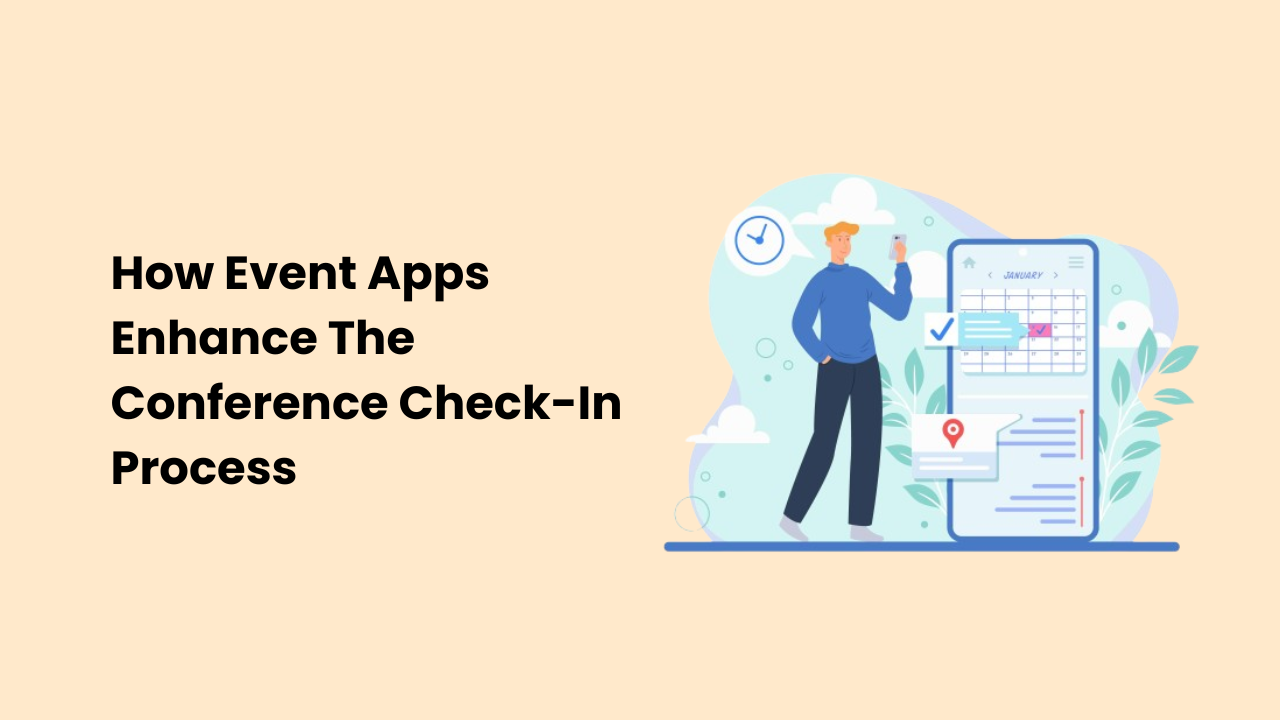
Event check-in processes have always been a hot topic of discussion since the time events became a thing. The reason for this is that they are the gateway to an event and if the gateway is not properly configured or established then it has the power to ruin an event’s experience. In the old days, check-in processes were terrible, lef to frustration and chaos. Now, with the establishment of mobile event apps, this hassle has been eliminated and made chaotic check-ins into efficient check-ins.
In this article, we will share knowledge on how event mobile apps enhance the entire check-in process for conferences and events in general.
The Evolution Of The Check-In Process
Speaking of the evolution of check-in processes, there used to be a time when event check-ins were full of long queues, paper-controlled registrations, and tremendous amounts of frustration and chaos. These practices got so out of control that there was an urgent need for some kind of relief or advancement. That is how mobile event applications evolved, initially just a scheduler and calendar app, over time promoted into a full-time event manager equipped with other modern tools.
Key Benefits Of Using Event Apps For Check-Ins
1. Faster Registration
Time is of the essence, especially when dealing with large-scale conferences. Event mobile apps enable attendees to pre-register, providing all necessary details in advance. On the day of the event, this pre-registration translates to a quick scan of a QR code or a simple tap on the mobile event app, reducing wait times and ensuring a smoother flow.
By automating tasks like identity verification and badge printing, mobile event applications allow staff to focus on other critical areas, such as addressing attendee inquiries or managing last-minute adjustments. This not only speeds up the process but also minimizes human error.
2. Real-Time Updates
One of the most significant advantages of an event app is its ability to provide real-time updates. Whether it’s a change in session timings, a speaker announcement, important venue details, etc. attendees can stay informed through push notifications. This feature of event mobile apps ensures that participants are always in the loop, bettering their overall experience.
Furthermore, organizers can use the app to instantly rectify errors in registration details or accommodate last-minute attendees without disrupting the flow of the event. The adaptability of mobile event applications is a critical factor in ensuring smooth operations.
3. Personalized Experiences
Modern attendees expect more than just basic functionality; they seek personalized interactions. Event apps cater to this demand by providing tailored features such as personalized schedules, session recommendations, etc. based on attendee profiles. A mobile event application can even integrate attendee preferences gathered during registration to suggest relevant sessions or exhibitors, making the experience more engaging.
This personalization extends to the check-in process itself. With an event app, attendees can choose from multiple check-in options—self-service kiosks, app-based check-ins, and even facial recognition systems—depending on their comfort level and preferences.
4. Enhanced Data Security
Data security is a growing concern in the digital age, especially during conferences that involve sensitive information. Event apps come equipped with robust security measures, such as encrypted data storage and secure login protocols, to protect attendee information. This level of security not only builds trust but also ensures compliance with data protection regulations.
For organizers, this means peace of mind knowing that their attendees’ information is safe. Additionally, mobile event apps often offer features like two-factor authentication for added security, ensuring that only authorized individuals gain access to the event.
5. Eco-Friendly Alternative
Sustainability is becoming a key consideration for events of all sizes. By digitizing the check-in process, event mobile apps significantly reduce the need for paper-based materials, such as printed tickets, badges, and schedules. This shift not only lowers environmental impact but also syncs with the growing preference for eco-conscious practices among attendees and organizers alike.
Features That Make Event Apps Indispensable
Integration with Wearables
Many modern event apps integrate effortlessly with wearable technology, such as RFID-enabled wristbands. These devices work in sync with the mobile event app to facilitate contactless check-ins, session tracking, and even cashless payments within the event premises. Such integrations add an extra layer of convenience while enhancing the attendee experience.
Analytics and Insights
Beyond improving the check-in process, mobile event applications also offer valuable analytics. Organizers can track real-time attendance, identify peak check-in times, and analyze attendee behavior patterns. These insights are instrumental in refining future events and ensuring continuous improvement.
Support for Multilingual Audiences
Global conferences often attract a diverse audience. Event apps that support multiple languages ensure that all attendees, regardless of their linguistic background, can guide the check-in process with ease. This inclusivity makes for a welcoming environment and broadens the event’s appeal.
The Future Of Check-In Processes
As technology continues to evolve, the role of mobile event applications in conference management will only grow. Emerging trends such as artificial intelligence and machine learning are poised to further enhance the capabilities of event apps, enabling predictive analytics, smarter matchmaking, and even more personalized experiences.
Moreover, the inclusion of advanced technologies like augmented reality (AR) and virtual reality (VR) into mobile event applications is redefining how attendees go through events. From virtual check-ins to immersive venue tours, the possibilities are endless.
Conclusion
The conference check-in process is no longer just a functional step; it’s a pivotal moment that shapes the attendee’s perception of the event. By utilizing the power of mobile event apps, organizers can transform this experience into an effortless, efficient, and enjoyable journey.
As the industry continues to embrace innovation, mobile event applications will remain at the forefront, redefining how conferences are managed and experienced. For organizers looking to stay ahead of the curve, investing in a robust event app is no longer a luxury—it’s a necessity.





Leave a Reply